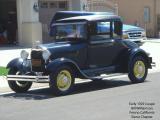|
|||||||
| Sponsored Links (Register now to hide all advertisements) |
|
|
 |

|
Thread Tools | Display Modes |
|
|
#1 |
|
Senior Member
Join Date: May 2010
Location: Mpls, MN
Posts: 27,582
|
About 10 years ago I bought a SUPCO capacitor tester and paid about $30 or $40 for it. Yesterday I saw this tester on ebay, but the price is so low I was wondering if anyone has tried it and found it to be accurate?
http://www.ebay.com/itm/381190482187...%3AMEBIDX%3AIT |
|
|

|
|
|
#2 |
|
Senior Member
Join Date: May 2010
Location: Cape Cod
Posts: 1,128
|
Tom,
These type of testers are very common and popular. However, I have always used an impedance bridge (General Radio) as a bridge gives both the value and "dissipation" factor. As I remember the story, the inventor (MIT Student) submitted the idea as a school project and received a "C" for the idea. The testers work by measuring the RC time constant of the capacitor and a precision internal resistor. Using math, the unknown cap is calculated. Marc |
|
|

|
| Sponsored Links (Register now to hide all advertisements) |
|
|
|
|
#3 |
|
Senior Member
Join Date: May 2010
Location: South East NJ
Posts: 3,398
|
What do you need it for?
My experience with the low end testers is some do a job, most seem to fail or act strange. At $13 you are not out much. |
|
|

|
|
|
#4 |
|
Senior Member
Join Date: Jun 2015
Location: Red Deer, Alberta
Posts: 5,715
|
I just use my Fluke 87
__________________
If you don't hear a rumor by 10 AM, start one!. Got my education out behind the barn! |
|
|

|
|
|
#5 |
|
Senior Member
Join Date: May 2010
Location: Cape Cod
Posts: 1,128
|
|
|
|

|
|
|
#6 | |
|
Senior Member
Join Date: Dec 2010
Location: FRESNO, CA
Posts: 12,560
|
Sponsored Links (Register now to hide all advertisements)
Quote:
 He has special tools that I don't even know what they're USED FOR???? He has special tools that I don't even know what they're USED FOR????Bill W.
__________________
"THE ASSISTANT GURU OF STUFF" |
|
|
|

|
|
|
#7 |
|
Senior Member
Join Date: Feb 2011
Location: NNNNNNNNJJJJJJJJJJ
Posts: 7,647
|
free tester at Harbor freight this month if you have the coupon
can buy something under a buck to use.................... |
|
|

|
|
|
#8 | |
|
Senior Member
Join Date: May 2010
Location: Mpls, MN
Posts: 27,582
|
Quote:

|
|
|
|

|
|
|
#9 |
|
Senior Member
Join Date: May 2010
Location: VA
Posts: 1,808
|
I mis-ordered a similar tester on Ebay when I needed an inductance meter for timing a magneto. You can have it for postage if you want. PM me.
|
|
|

|
|
|
#10 |
|
Senior Member
Join Date: May 2010
Location: Mpls, MN
Posts: 27,582
|
For those of you that bought this tester, you have probably found the instructions to be rather poor. I bought one and tried it out yesterday, so here's my instructions for using the meter.
Install a new 9 volt battery. Notice the + and - markings are very small, so be careful to install it correctly. Insert the black clip lead into the center jack. Insert the red clip lead into the left jack. I also tried the right jack, and it doesn't seem to matter, so I don't know why they have both. Turn the switch to straight up, which is the 2uF setting. The meter should show .000 at this time. Connect the red lead to the ground on the Model A capacitor. Connect the black lead to the brass terminal on the capacitor and the meter should read about .233, at least that's what my new capacitor shows. If you want the reading to show after you unclip the capacitor hit the hold button before disconnecting the capacitor. Turn the switch to off as soon as you are done, to save battery life. Capacitors should be shorted first before testing just to be sure they aren't holding a charge that could damage the meter. |
|
|

|
|
|
#11 |
|
Senior Member
Join Date: May 2010
Location: Princeton, NJ
Posts: 966
|
Wouldn't you have to test an ignition condenser at its full working voltage to be sure it is OK? I think a generic capacitor meter uses just a couple of volts, but an ignition condenser sees peak voltages of at least 100 volts...
Doug
__________________
My '31 S/W sedan project:http://31ford.dougbraun.com My restoration diary: http://dougbraun.com/blog |
|
|

|
|
|
#12 |
|
Senior Member
Join Date: May 2010
Location: Mpls, MN
Posts: 27,582
|
Yes, plus the heat factor. I would check it with the meter first, and if it passes the capacitance test, then I'd install it and make sure it runs OK in the heat.
|
|
|

|
|
|
#13 | |
|
Senior Member
Join Date: May 2010
Location: SPEEDWAY INDIANA
Posts: 4,148
|
Quote:
Very good point Doug , i agree . The primary side of the ignition especially running could be anywhere from 100 to 500 volts. Condensors are also tested with a automotive tester using not only capacity in mfds but series resistance and leakage....takes all three to make a good ignition cap.. 
|
|
|
|

|
 |
«
Previous Thread
|
Next Thread
»
|
|
| Sponsored Links (Register now to hide all advertisements) |
|
|
All times are GMT -5. The time now is 12:52 PM.










 Linear Mode
Linear Mode

